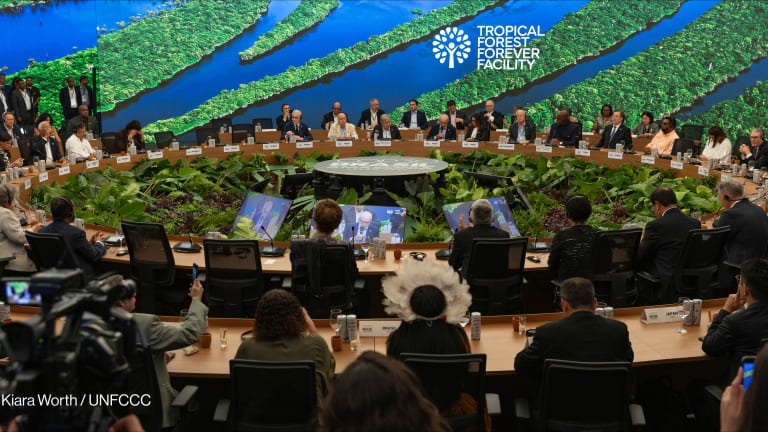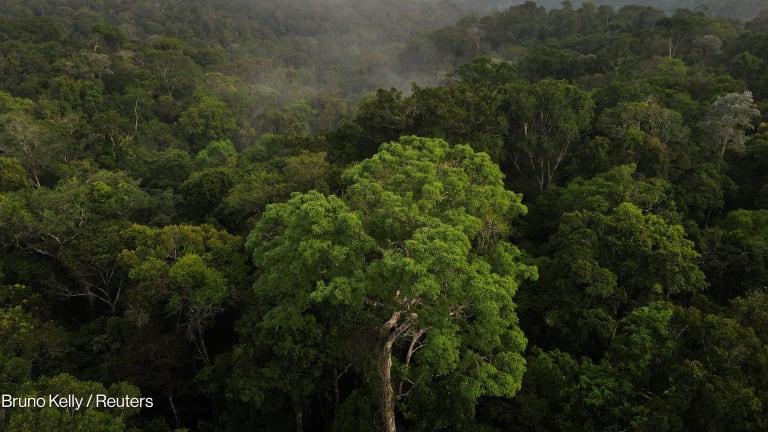
This month, the world’s leading climate scientists issued a report on land confirming what we already know: forests are a critical weapon in the battle against climate change. Yet as competition for land mounts, the destruction of forests for agriculture, mining, and infrastructure rages on.
This leaves us sorely in need of a global forest leader who can show the world how to build economies without taking down trees. On paper, we have one. The World Bank — with more than $600 billion in funds — asserts in its Forest Action Plan that forests and the communities who care for them are critical to its mission of sustainably ending extreme poverty and boosting shared prosperity.
More than 1.6 billion people depend on forests for food, medicine, and incomes, through sustainable logging and the harvesting of products found on the forest floor, from Brazil nuts and coconuts to frankincense and rattan. The IPCC report reminds us that these communities manage 300 billion metric tons of carbon in their trees and soil — 33 times global energy emissions in 2017.
While the World Bank is clearly aware of the many benefits of forests and the people who live in them, their commitment to forests doesn’t always play out on the ground.
In fact, when it comes to forests, there are two World Banks. One works hand-in-hand with government officials and indigenous and local communities in Mexico, Mozambique, and Nepal to preserve forests. This is a bank that has increased its forest protection investments by 16% relative to the prior three years and developed the novel Dedicated Grant Mechanism for Indigenous Peoples and Local Communities, which funnels funds for forest preservation directly to the people who benefit from forests most.
But then there is the other World Bank. This bank supports projects in the infrastructure, energy, extractives, and agriculture sectors that contribute to forest destruction. A recent report found that between 2014 and 2018, the World Bank bankrolled $21 billion for fossil fuels compared with $7 billion for clean, climate-smart renewables. We found that as of 2018, World Bank financing for forests only represents 1.2% of the bank’s overall portfolio.
A long bet on the future of Indonesia’s forests
A highly lauded, market-based forest conservation project in the peatlands of southern Borneo is doing everything right — except making money.
Unfortunately, many of the bank’s other 98.8% of projects put forests and the people who live in them at risk. Current projects in Indonesia, Democratic Republic of the Congo, Liberia, and Brazil seem poised to drive deforestation.
In DRC, for example, the bank has committed $120 million to the development and expansion of extractive industries and geochemical prospecting. In Indonesia, new World Bank projects are linked to infrastructure and industrial development, including unsustainable power generation.
And in Brazil, the bank’s private sector wing, the International Finance Corporation, is backing projects linked to sugarcane production and expansion, industrial development, and unsustainable power generation.
So how can the World Bank become a forest leader? The first step is establishing forests and the people who live in them as a tenet of sustainable development and then integrating measures that protect them into all of their projects — not just forest programs. The bank’s forest-smart mining report, which lays out how to make mining less destructive to trees, offers a start. It concludes, for example, that mining entities should expand the concept of impact to include indirect and cumulative impacts, which is where forests come in.
However, action on the ground, not just policies on paper, are critical. If the bank were to closely vet all potential new programs and projects to ensure they do no harm to forests, and shut down any that do, countries would listen and start treating forests as a key asset for sustainable development, beyond their value as timber.
In addition to incorporating forests into everything they do, the bank could also amp up funding for trees by directing funds earmarked for climate work to forest conservation and protection efforts. And it can hold its private sectors partners accountable for forest protection, disinvesting from projects with negative forest impacts.
All of this aligns with what the World Bank has pledged to do for forests. Fulfilling these promises would transform two banks into one that offers a guiding light for how we can keep forests standing, for everyone’s sake.








